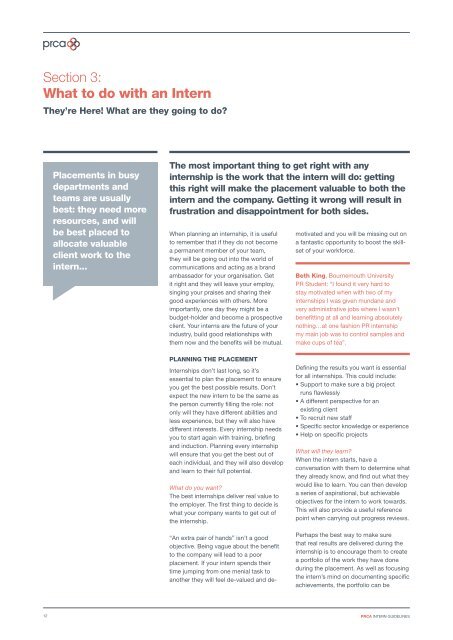PRCA Intern Guidelines
PRCA Intern Guidelines
PRCA Intern Guidelines
You also want an ePaper? Increase the reach of your titles
YUMPU automatically turns print PDFs into web optimized ePapers that Google loves.
Section 3:<br />
What to do with an <strong>Intern</strong><br />
They’re Here! What are they going to do?<br />
Placements in busy<br />
departments and<br />
teams are usually<br />
best: they need more<br />
resources, and will<br />
be best placed to<br />
allocate valuable<br />
client work to the<br />
intern...<br />
The most important thing to get right with any<br />
internship is the work that the intern will do: getting<br />
this right will make the placement valuable to both the<br />
intern and the company. Getting it wrong will result in<br />
frustration and disappointment for both sides.<br />
When planning an internship, it is useful<br />
to remember that if they do not become<br />
a permanent member of your team,<br />
they will be going out into the world of<br />
communications and acting as a brand<br />
ambassador for your organisation. Get<br />
it right and they will leave your employ,<br />
singing your praises and sharing their<br />
good experiences with others. More<br />
importantly, one day they might be a<br />
budget-holder and become a prospective<br />
client. Your interns are the future of your<br />
industry, build good relationships with<br />
them now and the benefits will be mutual.<br />
motivated and you will be missing out on<br />
a fantastic opportunity to boost the skillset<br />
of your workforce.<br />
Beth King, Bournemouth University<br />
PR Student: “I found it very hard to<br />
stay motivated when with two of my<br />
internships I was given mundane and<br />
very administrative jobs where I wasn’t<br />
benefitting at all and learning absolutely<br />
nothing…at one fashion PR internship<br />
my main job was to control samples and<br />
make cups of tea”.<br />
Planning the placement<br />
<strong>Intern</strong>ships don’t last long, so it’s<br />
essential to plan the placement to ensure<br />
you get the best possible results. Don’t<br />
expect the new intern to be the same as<br />
the person currently filling the role: not<br />
only will they have different abilities and<br />
less experience, but they will also have<br />
different interests. Every internship needs<br />
you to start again with training, briefing<br />
and induction. Planning every internship<br />
will ensure that you get the best out of<br />
each individual, and they will also develop<br />
and learn to their full potential.<br />
What do you want?<br />
The best internships deliver real value to<br />
the employer. The first thing to decide is<br />
what your company wants to get out of<br />
the internship.<br />
“An extra pair of hands” isn’t a good<br />
objective. Being vague about the benefit<br />
to the company will lead to a poor<br />
placement. If your intern spends their<br />
time jumping from one menial task to<br />
another they will feel de-valued and de-<br />
Defining the results you want is essential<br />
for all internships. This could include:<br />
• Support to make sure a big project<br />
runs flawlessly<br />
• A different perspective for an<br />
existing client<br />
• To recruit new staff<br />
• Specific sector knowledge or experience<br />
• Help on specific projects<br />
What will they learn?<br />
When the intern starts, have a<br />
conversation with them to determine what<br />
they already know, and find out what they<br />
would like to learn. You can then develop<br />
a series of aspirational, but achievable<br />
objectives for the intern to work towards.<br />
This will also provide a useful reference<br />
point when carrying out progress reviews.<br />
Perhaps the best way to make sure<br />
that real results are delivered during the<br />
internship is to encourage them to create<br />
a portfolio of the work they have done<br />
during the placement. As well as focusing<br />
the intern’s mind on documenting specific<br />
achievements, the portfolio can be<br />
12<br />
<strong>PRCA</strong> INTERN GUIDELINES


